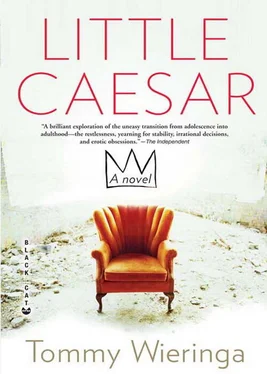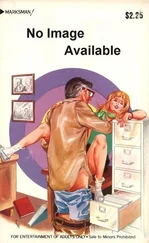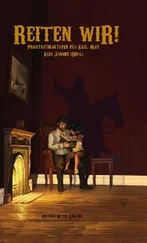It was summer, a few times I heard my aunt sigh goodness, it’s so hot . The heat to which I was accustomed was exceptional here. A few days after we arrived, my mother said she was going away for a little while. The evening before she left she came and sat on the edge of my bed. As she spoke, her eyes remained fixed on a point just above my head, on the light blue cornflowers on the wallpaper.
‘I thought maybe we could be at home here,’ she said. ‘My family close by, your uncle and aunt, but I was wrong. I can’t live here. There are a couple of places I need to take a look at, I’ll try to come back as quickly as possible, okay, sweetheart? Will you be nice to Uncle Gerard and Aunt Edith?’
And so I remained behind, for I don’t remember how long. Long, dry days flowed together endlessly. Motors pumped water out of the canal to quench the land. Teetering columns of dust above the flat fields bore up the azure-blue dome of sky.
In the villages I saw, the houses were all built of red bricks. It oppressed me, the darkness of it, the square staunchness — there was no resemblance at all to the orderless festering of the city where I was born.
At the kitchen table I tasted vanilla custard for the first time. Custard from the bottle, yellow and glutinous and almost as delicious as the pastries at Trianon. Uncle Gerard scrimped the last bits from the bottle with a thing he called a ‘bottle licker’. After meals Aunt Edith went to the kitchen and used a scraper to remove the final remains from the pans.
Uncle Gerard took an old scooter out of the shed, pumped up the tires and showed me how the thing was used. He was good to me, Uncle Gerard, not as strict as Aunt Edith, who gave me the feeling that I even breathed wrong. The scooter expanded my world. My forays along the straight canal became longer, I would get as far as the locks where children sometimes swam and dove from the wall into the water. From the shade of the poplars, I watched them. I didn’t approach them, they left me alone. They belonged together, there was no room for outsiders. I looked at the shimmering curtains of water when they did cannonballs, one of the boys was the king of the ‘atom bomb’, the column of water that shot up then was higher than ever — and that was how I became invisible of my own accord, a pale spot off beneath the poplars, dreaming away the summer there — I watched, I drank deeply of paradise there and even though I didn’t take part it still seems to me a flaw in the fabric of creation that one day you stop cycling to the locks, stop doing cannonballs in a pair of floppy swimming trunks, stop wrestling with the others and swimming underwater, smoothly and fluidly as sea lions, to give the girls a dunking — that you grow out of that, become too old for that, is something which I have always seen as a sign that the soul exists, and that it can be ruined.
And then, suddenly, the whole troupe comes to life, the disorderly pile of bikes is untangled, they take off.
‘Nice scooter you got there,’ one of them says in passing.
That really makes them laugh, and impresses on me that I am too big for it, for this scooter, just as they will soon be too big for the locks, for bare feet on pedals, for the sand between their toes.
At the table I say nothing about my daydreams. My face, my body exhale the light, the heat that my skin has breathed in during the day. I wonder whether Uncle Gerard, somewhere in one of his sheds, might have a bicycle that would fit me. I’ll ask him when she’s not around. I ask for more potatoes. Aunt Edith dishes two onto my plate.
Not long after dinner I put on my pajamas and watch TV in the front room. Then it’s time for me to go upstairs. The runner on the stairs muffles my footsteps.
‘Good night,’ says my aunt in the doorway.
The light worms its way in through the curtains, I toss off the sheet and walk to the window. It looks out on the canal, the poplars, on the farms and fields beyond. Uncle Gerard is watering the lawn in front of the house. When is my mother coming back? Since she left, no-one has said a word about her. I don’t know where she is; the thought that she won’t come back and that I will have to stay here forever carries me to the gates of panic. Shadows crawl over the road, nestle down between the trees and bushes, the water turns dark. She will come back, she would never leave me all alone. I’m in her thoughts the same way she is in mine, she will come to get me. I fall asleep only after I hear my uncle and aunt talking quietly on the landing, after I hear their bedroom door open, the discreet click of the key in the lock.
*
‘A bicycle?’
Uncle Gerard claws at the stubble on his chin.
‘No, boy, I don’t have one of those. Ours, but it’d be too big for you. Do you know how to ride a bike?’
I figured I did, that was just something you could do, wasn’t it? The kids at the locks rode bikes as though they’d been born on them.
‘When’s my mother coming back?’ I wanted to know.
‘Oh,’ Uncle Gerard says.
He shrugs. I don’t receive an answer. In me that day rise up the first words that have to do with the great parting. The choral response to the requiems I will write for her down through the years. Oh beautiful mother, who art in heaven, hallowed be thy name . . the wreckage of prayers from the Alexandria Community Church becomes part of the lesser Office for the Dead. While I scoot furiously along the canal, the words well up, farewell Mother, don’t leave me alone, Aunt Edith is a bitch, come back, come back . .
One evening a taxi pulled up in front of the house, I had already put on my pajamas. The door flew open, I ran barefoot down the garden path, through the gate, and rushed into her arms.
‘Ludwig! You’ve gotten so much heavier!’
At that moment I’m suddenly filled with poison and rage, it had all lay hidden behind the missing and the fear — she left me alone. She’ll do it again. Again and again . My embrace weakens. The kiss dies on my lips.
‘How was it, sweetheart? Did everything go well? Did you have a nice time?’
She didn’t even call me once. If she had, she could have asked me all those things. Not once. Shivering, I sink into a pool of accusations. Later, at the table, my aunt says, ‘The way cats are too. Until they remember who puts the dish out for ’em.’
She had traveled all over northwestern Europe. She was enthusiastic about darling little coastal towns in northern France but found Picardy depressing and decrepit. The Danes were friendly but so bourgeois, it was only in England that she thought there might be possibilities for us. She hadn’t found a house yet, she wanted to go looking along the east coast. In Alexandria she had known lots of English people with whom she got along well.
‘The English understand eccentricity,’ she said.
The next day I pack my red suitcase and descend the noiseless stairs. I walk into the front room.
‘That’s the way we see it,’ my aunt was saying.
My mother’s voice.
‘The beam in your own eye, Edith. You’ve overlooked that one again.’
They catch sight of me too late to cover up the hardness in their voices. My mother says, ‘Then I think it would be better if we didn’t see each other again.’
She grabs me by the arm and pushes me forward.
‘Say thank you to your uncle and aunt, Ludwig.’
I stand on tiptoes to kiss Aunt Edith; she doesn’t bend over far enough and so the kiss lands on the wattles under her chin. I kiss Uncle Gerard too, the uneasiness growling in his throat.
‘Goodbye, fella, it was fun.’
We leave the room; in the hallway she seizes her suitcase, we walk out of the garden, onto the brick-paved road. The open sky, the raging sun overhead. She clamps my hand in hers, in the other she’s clenching the suitcase, its wheels rolling half over the bricks and half over the dusty verge. We’re heading towards the locks.
Читать дальше












